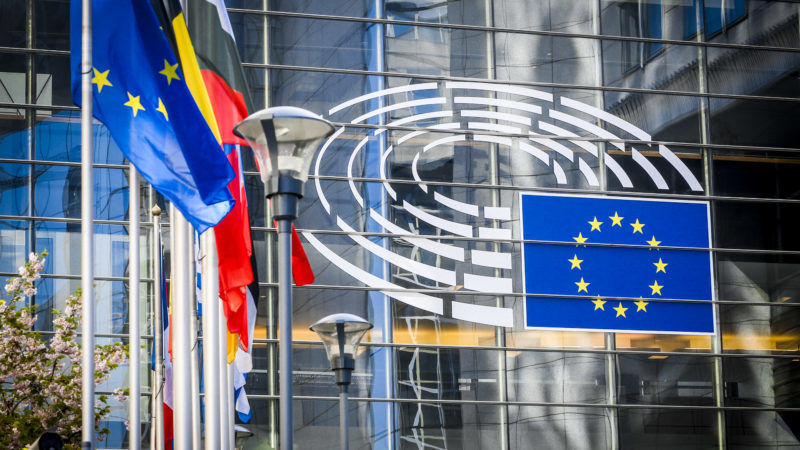A policy document presented in Brussels on 26 May calls for the European Union to assume leadership of the international sanctions coalition and strengthen economic pressure on Russia.
Western countries imposed extensive sanctions on Russia in response to its annexation of Crimea in 2014 and the 2022 invasion of Ukraine, aiming to cripple Russia’s economy, restrict access to finance and technology, and pressure Moscow to change its political behavior.
The “White Paper: The Future of European Leadership in the Economic Deterrence of Aggression” analyzes the achievements and vulnerabilities of EU sanctions policy while proposing practical tools to enhance the bloc’s economic security.
The document, prepared by the National Sanctions Coalition, outlines specific instruments for both responding to Russian aggression and countering future threats. Key recommendations include creating a unified EU sanctions body, implementing an analogue to the US entity list, strengthening control over high-risk goods exports, introducing extraterritorial (secondary) sanctions for circumvention assistance, and maintaining sanctions against Russia’s defense sector and critical infrastructure even after hostilities end.
“The sanctions instruments proposed in the White Paper are aimed at ending the Russian war in Ukraine as quickly as possible — by reducing Russia’s income and limiting its military-industrial potential,” said Denis Gutyk, executive director of the Council of Economic Security of Ukraine and co-author of the document.
According to the white paper, Russia has earned approximately €887 billion ($1,014.4 bn) from energy exports since February 2022, significantly exceeding the €211 billion ($241.4 bn) spent on its war effort during the same period. The document notes that from February 2022 to early 2025, the European Union spent more than €207 billion ($236.8 bn) on imports of Russian fossil fuels despite existing sanctions.
Tomáš Šindelář, Deputy Head of the Sanctions Unit at the European External Action Service (EEAS), supported the nitiative outlined in the White Paper. Using the example of countering Russia’s shadow fleet, he explained how EU sanctions instruments have already evolved.
“Initially, we focused exclusively on ships, but recent analysis showed that there is an entire ecosystem of operators around the shadow fleet — insurance companies, fleet managers, service providers,” Šindelář said. “And if these entities are also seriously affected by sanctions, this allows disrupting the operation of the entire mechanism while maintaining pressure on the fleet itself.”
The 17th sanctions package became the first where Europe applied such an approach, according to Šindelář. Europe more than doubled the number of vessels under sanctions and for the first time included in the restrictions not only the vessels themselves, but also related operators — not only in Russia, but also in third countries.
The white paper identifies several challenges facing EU sanctions policy, including limited extraterritorial application of restrictive measures, consensus requirements that slow decision-making, and heterogeneous enforcement approaches across member states. The document said that while the US has imposed 494 secondary sanctions targeting entities across 57 countries since the invasion began, the EU’s sanctions regime cannot yet be regarded as fully extraterritorial.
According to the document, approximately 70% of Russia’s oil exports are now transported via a “shadow fleet” of over 1,000 vessels, of which only 153 are currently subject to EU sanctions. The paper warns that more than 72% of these vessels are over 15 years old, increasing risks of mechanical failures, collisions, and oil spills that could cost coastal states up to €1.6 billion ($1.8 bn) in damages and cleanup efforts.
Russia uses a “shadow fleet” of vessels to evade sanctions by frequently changing ship names and flags, turning off AIS tracking, using complex ownership structures, and conducting ship-to-ship oil transfers at sea to obscure the origin of cargo.
The white paper also addresses the issue of frozen Russian assets. Approximately €210 billion ($239 bn) in Russian Central Bank assets have been frozen within the EU, with more than half held at Euroclear Bank. Despite substantial volumes of frozen assets, the document identifies legal challenges to confiscation, including the principle of sovereign immunity under international law.
Among specific recommendations, the document calls for adopting EU Council decisions to confiscate Russian sovereign assets and transfer them to support Ukraine.
Earlier, the Baltic states, Northern European countries, and Finland have openly called for the immediate confiscation of frozen Russian assets, with Finland’s finance minister Riikka Purra urging the EU to proceed with seizure.
France has also proposed seizing assets if Russia breaches a future ceasefire in Ukraine, while key EU officials like Valdis Dombrovskis and Maria Luís Albuquerque support the idea, though major states like Germany and France remain cautious about full confiscation.




